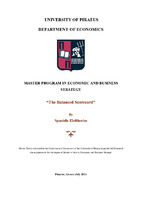The balanced scorecard
Κάρτα ισορροπημένων επιδόσεων

Master Thesis
Συγγραφέας
Σπανίδης, Ελευθέριος
Spanidis, Eleftherios
Ημερομηνία
2023-07Επιβλέπων
Πολλάλης, ΙωάννηςPollalis, Ioannis
Προβολή/
Λέξεις κλειδιά
Balanced scorecard ; Performance measurement ; Strategic management ; Key performance indicators ; Strategy execution ; Strategy alignment ; Organisational performance ; Performance evaluation ; Performance metrics ; Financial perspective ; Customer perspective ; Internal processes perspective ; Learning and growth perspective ; Strategy implementation ; Performance improvement ; Stakeholder satisfaction ; Organisational effectiveness ; Data-driven decision making ; Cascading objectives ; Scorecard designΠερίληψη
Η παρούσα διπλωματική εργασία εξετάζει τον Πίνακα Ισορροπημένης Στοχοθεσίας, ένα εργαλείο στρατηγικής διαχείρισης που στοχεύει στην παροχή μιας ολιστικής άποψης της οργανωτικής απόδοσης. Η διπλωματική εργασία εμβαθύνει στην ιστορία, τα οφέλη, τις προκλήσεις και την εφαρμογή του Balanced Scorecard. Περιλαμβάνει επίσης ένα τμήμα ερωτηματολογίου που συγκεντρώνει πολύτιμες πληροφορίες από επαγγελματίες. Η έρευνα υπογραμμίζει τη σημασία του Balanced Scorecard για τη βελτίωση της απόδοσης, την ευθυγράμμιση των στρατηγικών και τη μέτρηση των αποτελεσμάτων.
Εισαγωγή:
Η εισαγωγική ενότητα θέτει τις βάσεις με τον ορισμό της Κάρτας Ισορροπημένης Στοχοθεσίας και την επισκόπηση των στοιχείων της. Επισημαίνει τη σημασία του καθορισμού στόχων SMART και παρουσιάζει το περίγραμμα των επόμενων κεφαλαίων.
Κεφάλαιο Ι: Ορισμός και επισκόπηση του Balanced Scorecard:
Αυτό το κεφάλαιο προσφέρει μια ολοκληρωμένη κατανόηση του Balanced Scorecard. Ορίζει την έννοια και διερευνά τα τέσσερα στοιχεία της. Επιπλέον, καθοδηγεί τους αναγνώστες στην κατασκευή ενός αποτελεσματικού Balanced Scorecard και δίνει έμφαση στη χρήση των στόχων SMART για να διασφαλιστεί η σαφήνεια και η εστίαση.
Κεφάλαιο II: Ιστορία της Κάρτας Ισορροπημένης Στοχοθεσίας:
Στο κεφάλαιο αυτό εξετάζεται διεξοδικά η ιστορική εξέλιξη της Κάρτας Ισορροπημένης Στοχοθεσίας. Παρακολουθείται η προέλευση της έννοιας, ξεκινώντας από το πρωτοποριακό έργο Γάλλων μηχανικών τη δεκαετία του 1930. Στη συνέχεια, το κεφάλαιο διερευνά τις μετέπειτα εξελίξεις, συμπεριλαμβανομένης της συμβολής της General Electric, του Peter Drucker και του Robert Kaplan. Επισημαίνεται επίσης ο μετασχηματιστικός αντίκτυπος του Dr. Nolan Norton και του έργου του Kaplan στη δεκαετία του 1990.
Κεφάλαιο III: Οφέλη της Κάρτας Ισορροπημένης Στοχοθεσίας:
Το κεφάλαιο αυτό διερευνά τα διάφορα οφέλη που συνδέονται με την εφαρμογή του Balanced Scorecard. Δίνει έμφαση στον τρόπο με τον οποίο οι οργανισμοί μπορούν να ενισχύσουν την απόδοση με τη χρήση αυτού του εργαλείου στρατηγικής διαχείρισης. Το κεφάλαιο διερευνά τον τρόπο με τον οποίο το Balanced Scorecard διευκολύνει τη στρατηγική ευθυγράμμιση και μετρά αποτελεσματικά τα αποτελέσματα. Αναγνωρίζει επίσης τους περιορισμούς και τις προκλήσεις που μπορεί να προκύψουν κατά την εφαρμογή.
Κεφάλαιο IV: Προκλήσεις της Κάρτας Ισορροπημένης Στοχοθεσίας:
Εξετάζοντας τα πιθανά εμπόδια που αντιμετωπίζονται κατά την εφαρμογή, το κεφάλαιο αυτό παρέχει πληροφορίες σχετικά με τις προκλήσεις της Κάρτας Ισορροπημένης Στοχοθεσίας. Διερευνά την επιλογή των κατάλληλων μέτρων, τη διατήρηση της εστίασης και την αποφυγή της υπερβολικής εξάρτησης από τις μετρήσεις. Με την αντιμετώπιση αυτών των προκλήσεων, οι οργανισμοί μπορούν να βελτιστοποιήσουν τα οφέλη της Κάρτας Ισορροπημένης Στοχοθεσίας.
Κεφάλαιο V: Εφαρμογή της Κάρτας Ισορροπημένης Στοχοθεσίας:
Αυτό το κεφάλαιο προσφέρει έναν πρακτικό οδηγό για την εφαρμογή της Κάρτας Ισορροπημένης Στοχοθεσίας. Παρέχει στους οργανισμούς ένα πλαίσιο για την αποτελεσματική καθιέρωση της προσέγγισης της Ισορροπημένης Κάρτας Στοχοθεσίας. Επιπλέον, περιγράφει τις βασικές αρμοδιότητες και προτείνει στρατηγικές για τον καθορισμό ρεαλιστικών στόχων ευθυγραμμισμένων με τους οργανωτικούς στόχους.
Κεφάλαιο VI: Ερωτηματολόγιο:
Το τμήμα του ερωτηματολογίου περιλαμβάνει μια μελέτη που διεξήχθη για να συγκεντρωθούν οι απόψεις του πραγματικού κόσμου σχετικά με την εφαρμογή της Κάρτας Ισορροπημένης Στοχοθεσίας.Περιλαμβάνει μια εισαγωγή στο ερωτηματολόγιο, λεπτομέρειες σχετικά με το δείγμα και τη μεθοδολογία που χρησιμοποιήθηκε για τη διανομή και τη συλλογή των απαντήσεων.Τα ευρήματα από αυτό το ερωτηματολόγιο προσφέρουν πολύτιμες πληροφορίες σχετικά με τις εμπειρίες και τις αντιλήψεις των επαγγελματιών σε σχέση με την Ισορροπημένη Κάρτα Στοχοθεσίας.
Συµπέρασµα:
Εν κατακλείδι, η παρούσα διπλωματική εργασία παρέχει μια ολοκληρωμένη ανάλυση της Κάρτας Ισορροπημένης Στοχοθεσίας, της ιστορίας της, των πλεονεκτημάτων, των προκλήσεων και των στρατηγικών εφαρμογής της.Με την υιοθέτηση αυτού του εργαλείου στρατηγικής διαχείρισης, οι οργανισμοί μπορούν να βελτιώσουν τις επιδόσεις τους, να ευθυγραμμίσουν τις στρατηγικές τους και να μετρήσουν αποτελεσματικά τα αποτελέσματα. Η ενότητα του ερωτηματολογίου προσθέτει πραγματικές προοπτικές, εμπλουτίζοντας τη συνολική κατανόηση των πρακτικών επιπτώσεων του Balanced Scorecard.
Η έρευνα που παρουσιάζεται σε αυτή τη διατριβή όχι μόνο συμβάλλει στην επιστημονική βιβλιογραφία για το θέμα, αλλά προσφέρει επίσης εφαρμόσιμες ιδέες για τους επαγγελματίες που επιδιώκουν να εφαρμόσουν το Balanced Scorecard στους οργανισμούς τους.Τα ευρήματα υπογραμμίζουν τη σημασία ενός καλά δομημένου Balanced Scorecard που ευθυγραμμίζεται με τους οργανωτικούς στόχους και επιτρέπει την αποτελεσματική μέτρηση των επιδόσεων και τη λήψη στρατηγικών αποφάσεων.


